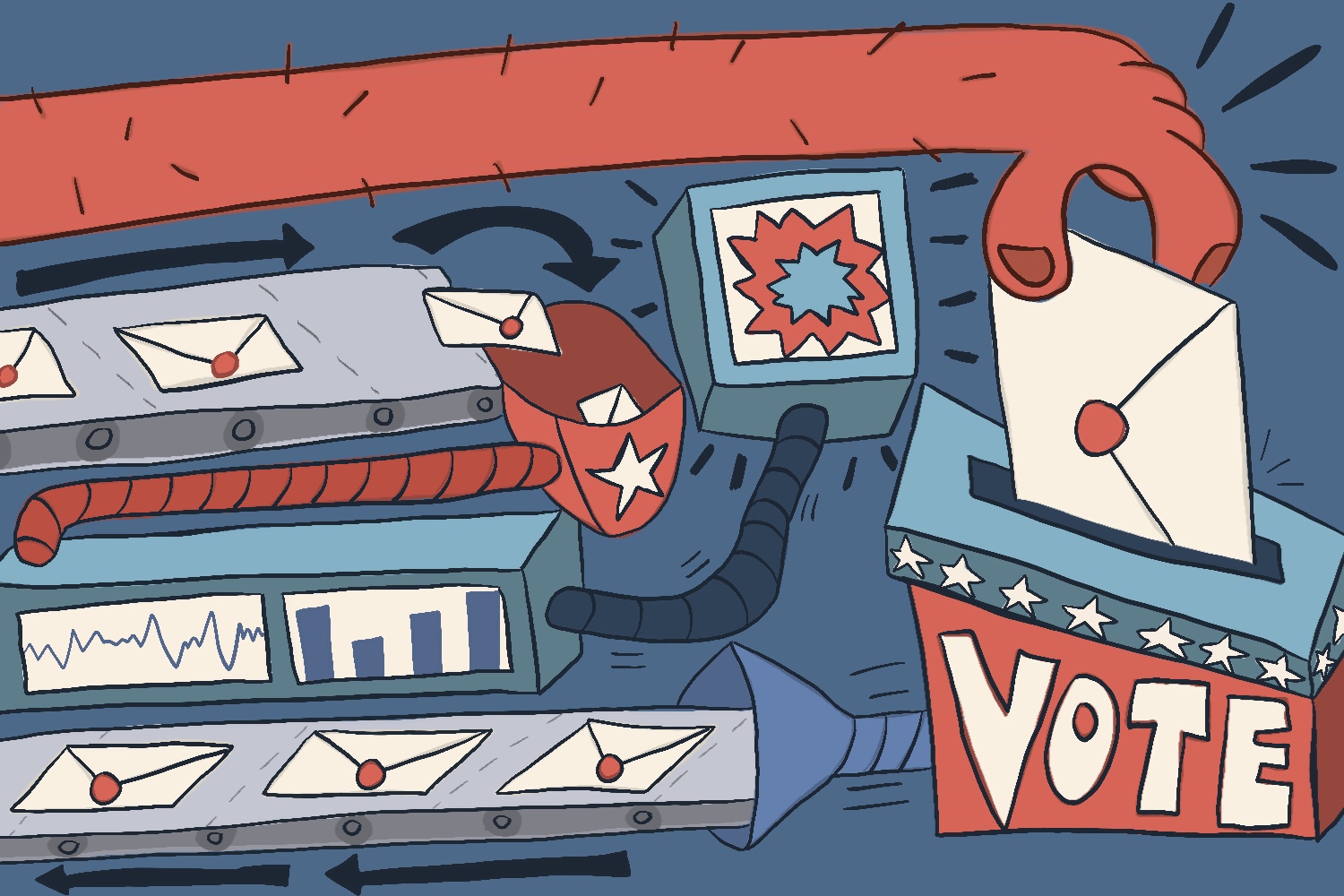The 2004 Presidential Election promised to be a memorable one. The key components were all there: two large-profile candidates, each with a large and adamant group of supporters, a war in Iraq, nationally debated issues of gay marriage and abortion on the table, and the constant threat of an eminent terrorism attack. Voting became more of an issue than it has been in any recent elections, especially among the youth.
The fact that organizations were formed, and past organizations were brought to light encouraged young people to vote. Among these were the non-profit and non-partisan organizations Rock the Vote, Declare Yourself, Project Vote Smart, and, perhaps the strangest of the selection, Smackdown Your Vote, an organization created by the World Wrestling Entertainment industry. All these organizations were geared specifically toward youth, and particularly toward college students. MTV’s Choose or Lose program watched the election closely and used famous names, such as hip-hop rapper P. Diddy, to persuade students between the ages of 18 and 25 to “get out and vote.”
College students have historically been among the most politically active age groups in America. One need only to look at the civil rights movements of the 60’s and 70’s to see that this is true, but in recent years, they have been seen to be more apathetic toward politics and voting then they had been in the past. We saw a change in that attitude this election year, and, in fact, since the 9/11 bombings and the ousting of Saddam Hussein in Iraq.
The University of Vermont is home to many political activism groups that have been fiercely active in this election, among them the Campus Progressives, the College Democrats, the College Republicans, the International Socialist Organization, and the Students for Peace and Global Justice. UVM is also one of the most liberal-minded schools, providing overwhelming support for feminism, rights for gays and lesbians, and, perhaps the most well known, decriminalization of marijuana.
How did the results of this recent election affect UVM as a whole, its students in particular, and its environment in general? On November 3, 2004, the day after voting day, John Kerry made a phone call to George W. Bush conceding the election. In calling the president, John Kerry abandoned a threat to contest the election result in Ohio in deference to a decisive popular vote victory by Bush. He somberly told his supporters, “We cannot win this election.”
George W. Bush had won by a slim margin in 2000, without the support of the majority of the popular vote. This election, Bush won about 8.7 million more popular votes than he did in 2000, showing our country to be fairly well situated in the middle right. Bush won 274 electoral votes, 3 more than in 2000, with Iowa (7 votes) and New Mexico (5 votes) not yet officially in his column. Kerry had 252 votes, and was debating on whether to contest the results for Ohio, a key state in this election, and a state that no Republican winner has ever not had.
The election results caused uproar at UVM. At twelve o’clock on Wednesday November 3rd, students and Burlington residents gathered downtown on Main Street to the election. Though the results of the election had been decided and accepted in Washington, students in Vermont still cried for change, for a recount, for a challenge – anything that would unseat Bush. “It’s important to stand up for what you believe in, even if the results have already been decided,” says UVM sophomore Tyler George-Minetti. Some of the students who came out were Kerry supporters, and some of them were supporters of Independent candidate Ralph Nader, but many of them were there because they were simply against the two-party system that gives us so little choice in who is going to run our country.
Students for Peace and Global Justice President, Natalie Fajardo, says that the rally was organized by a program called DARE, which stands for Direct Action Resisting Empire, and that the rally would have occurred no matter who won. “Regardless of what happened in the election, we were still planning on having a protest against the two-party system. However, the fact that Bush won definitely made more people come out,” says Fajardo. A group of students numbering about 40-50 marched downtown, and were joined by more students and Burlington residents, so that the end number was around 80-90 people
At ten o’clock the same night, students gathered on Redstone Green for the same reasons, to protest the reelection of Bush and the two-party system. The crowd was faintly reminiscent of the Red Sox riots only a few weeks before, and its organization was influenced by these riots as well. “The night rally was not organized by DARE, but was spontaneously started by students (some of whom were members of DARE) who thought that it was stupid to have a riot over baseball but not over an election that determines our country’s fate for the next four years,” says Fajardo.
Though the rally was less violent and less drunkenly motivated than the Red Sox’s riots, it was also somehow less impassioned. The group of students yelled and chanted Bush insults for a few minutes, and then slowly dispersed, disheartened, and leaving behind only a few die-hards.
This election encouraged millions of students across the nation, including those at UVM, to vote, but now that the elections are over, there is an after-the-party feeling of “is this it?” After being told how much each of our own individual votes count, and how important it is for students to vote, many students are now wondering if they really had any say at all. After months of protests, activism, and heated political debates, we are now left with a president that Vermont, and especially UVM students, overwhelmingly voted against. Where does that leave us?
















